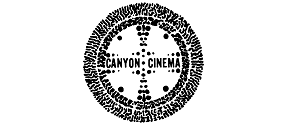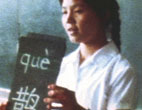Chinese Typewriter, The
- Daniel Barnett |
- 1978-1983 |
- 28 minutes |
- COLOR |
- SOUND
Rental Format(s): 16mm film
The Chinese Typewriter was the first American film shot in China after the end of the Cultural Revolution, an extraordinary time that marked the opening of Chinese society and began China's modernization.
The Chinese Typewriter is the longest and most complex in a series of sketches, poems and essays that I shot during a two week period visiting the major eastern cities of Beijing, Shanghai, Yangchow, Nanking and Guangzhou. It is the first in an ongoing series of poetic essays on culture and belief.
-Daniel Barnett
Gregory Solman - BOSTON PHOENIX 2/26/85:
"The Chinese Typewriter is about education and language, and the way a society is shaped by them. It exemplifies the politically committed film that defies the strict rubric of avant-garde. Barnett seems less interested in challenging traditional form than in exploding his own occidental vision. He transforms cyclonic cutting among a character-filled Chinese printing shop, a school, and street life into a visual poem that extracts the country's fierce mechanistic energy while leaving the fragrant residue of humanity. The film is compositionally meticulous and rhythmically arresting, as Barnett goes beyond facile, formalist, dehumanization of post-Mao China imagery. Contrasting a stop action view of a schoolgirl doing a cartwheel with contemplative, pointillist, high-angle shots of sidewalk life. The repeated sloganeering of public-school apologists, spiced with oriental music and street beat forms a soundtrack with the haunting quality of a Davis Byrne/Brian Eno experiment. Red objects, from scarves around necks to newsstands draped with crimson like a shroud - pull the eye to what become found object vanishing points. Despite the multitude of images-over 3000 on 28 minutes, the film never seems capricious or ostentatious."
Susan Orlean - BOSTON PHOENIX 5/84:
"THE CHINESE TYPEWRITER provoked me to rave for days.... an alarming, funny, gorgeous work."
Mary Badger; Bromfield Gallery Notes:
"Barnett is a modern Vertov; wiser, reflective, and without the naive trappings of a prophet."
Description from the National Library of Australia:
As a reflection on culture and language this film occupies a space somewhere between film essay and visual poem. Images and sounds of everyday life - in the street, the classroom, the theatre and the print shop - were recorded in China in 1978 and woven into a multi-layered construction on the optical printer. The filmmaker sees an analogy between the Chinese typewriter (invented shortly after his visit to China), which is used to manipulate thousands of ideograms and the optical printer on which he manipulated thousands of images.











